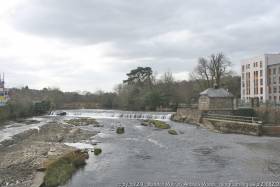Displaying items by tag: Bandon
Flood Relief Scheme Begins On River Bandon
#FloodRelief - The scheduled Bandon Flood Relief Scheme work programme for 2017 has now commenced on the River Bandon in Co Cork.
The scheme consists of a combination of flood defences and dredging of the river bed to a level of 9.5m downstream of the Bandon weir (about 1.8m below the existing bed level) in the town and at a grade of 1/1,000 until it reaches the existing bed level 3.6km downstream of Bandon town.
Some 150,000 cubic metres of material will be dredged in the scheme, while new flood defences will also be constructed to contain flood water within the Bandon and Bridewell Rivers as well as the Mill Stream.
Since July 2016, Inland Fisheries Ireland’s (IFI) local representatives have attended meetings with the contractor Wills Bros Ltd, the employer’s representatives (ByrneLooby/PH McCarthy) and environmental consultants to the contractor (Rivus) to review the specific methodologies proposed to undertake the works.
While maintaining a positive approach to the Flood Relief Scheme, IFI says it made proposals in relation to the proposed methods of dredging, sediment management and solids level monitoring, in order to minimise any potential negative impact on the habitat, fish and aquatic invertebrate populations of the river.
While there is some discolouration of the River Bandon expected downstream of the works, IFI says it is reassured by ByrneLooby/PH McCarthy that the Construction Environmental Management Plan (CEMP) and agreed sediment management and solids monitoring plans are being followed.
IFI will continue monitoring dredging works and will bring any non-compliance with the conditions set out to the immediate attention of ByrneLooby/PH McCarthy to ensure corrective measures are put in place.
Any repeated or deliberate non-compliances would be dealt with by IFI using its statutory powers.
Inland Fisheries Ireland Issues Statement On Response To Flooding Crisis
#Flooding - Inland Fisheries Ireland has issued a statement in response to the ongoing flooding crisis across the country following last month's winter storms.
Citing its history of working "in a positive and proactive manner" with the Government, State agencies, local authorities and others on the drainage and management of surface waters, IFI says it "will work with all relevant parties in expediting emergency flood relief works."
Following the recent meeting on the Shannon flooding crisis, IFI says it has offered emergency assistance on the ground, and suggested that the Local Authority (Works) Act 1949 be used as a legal instrument by which "exemptions for emergency in stream works could be progressed".
According to IFI chief executive Dr Ciaran Byrne: “Fisheries legislation provides for a closed season for undertaking instream works. However, in emergency circumstances, such as those currently being experienced, the 1949 Act provides for the relevant minister to issue an exemption subject to taking precautions and making provisions for the protection of fisheries.”
Cork County Council has already requested exemption from the closed season for instream works from now through to the end of 2017, though IFI says that falls beyond the scope of the Act, which only provides for emergency works.
Regardless, IFI maintains that it will continue to work with Cork County Council on the removal of excess gravel from the Bandon River downstream of Bandon's old road bridge "to allay fears that these gravels may cause flooding".
IFI's statement adds that it looks forward to the successful implementation of the upcoming OPW Bandon Main Drainage Scheme.
Scheduled to begin in June this year, the works will see the rock bed of the river lowered by up to 2m in the heart of the town, tapering downstream for up to 3.5km.
This scheme was agreed several years ago and was prepared by the OPW following consultation and consultative reports. It includes provision for a fisheries habitat rehabilitation programme once the design bed levels and flood conveyance capacity are achieved.





























































